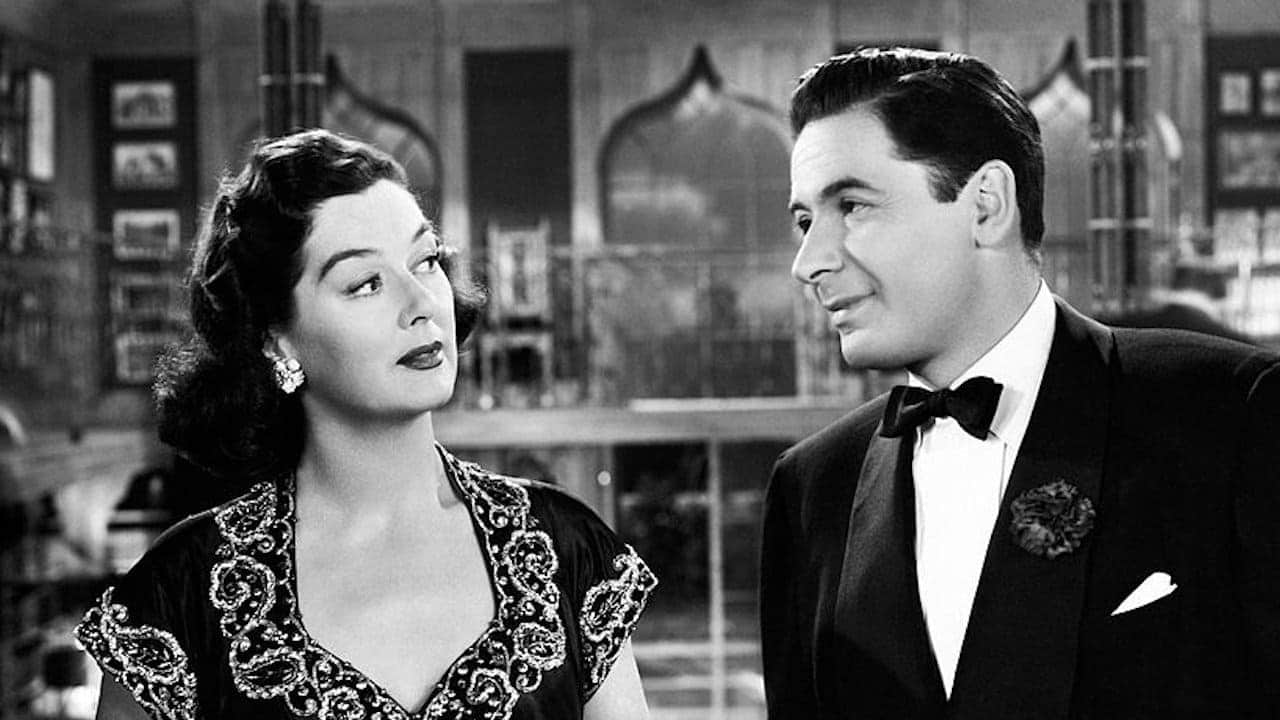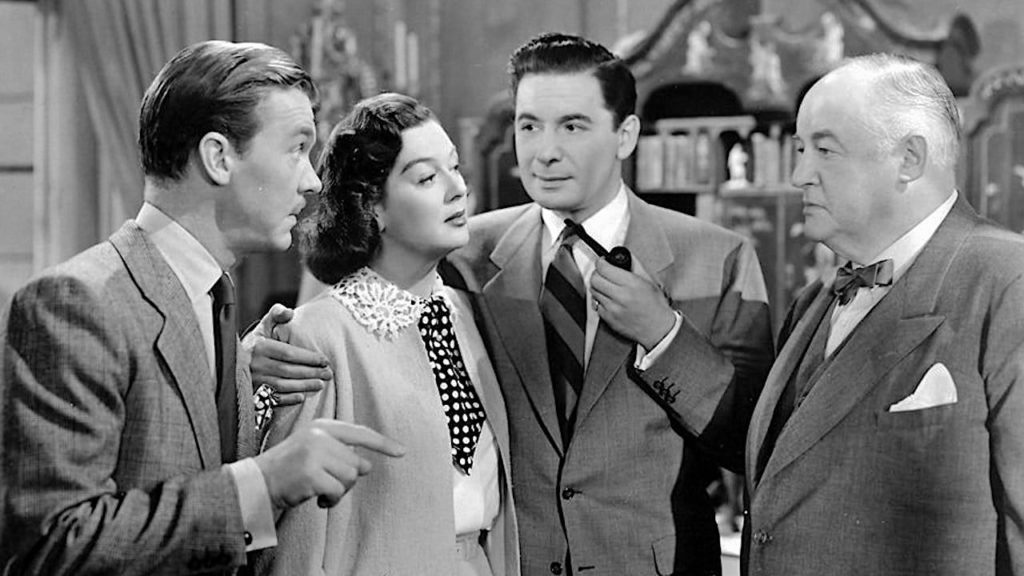In The Velvet Touch, a Broadway star accidentally kills the impresario who made her a star after arguing with him about whether she should abandon frothy comedy (and him) and pursue a noble career in serious theatre.
That’s the opening scene dealt with. The rest of the film concerns itself with the actress’s fate. Will she get caught, confess the crime or get away with it?
Whether it indicates her character’s superior opinion of herself or masks her own incipient double chin, Rosalind Russell plays Valerie as a head-held-high kind of gal, an actress who saw herself starring in an upcoming production of Hedda Gabler. But impresario Gordon Dunning (Leon Ames) had other ideas, and was reluctant to let her go. Not least because he was in love with his protégée, who over the years has proved to be a beddable as well as bankable asset.
But no more. Now Gordon is dead. Though suspicion falls not on Valerie, remarkably, but on lesser actress Marian Webster (nicely hissable Claire Trevor), who used to be Gordon’s lover until Valerie came along. Marian can’t stand Valerie, and doesn’t mind telling her that to her face.
Written by Leo Rosten, who studied psychology at Chicago (where he met and befriended most of the founding fathers of neoliberalism, though that’s another story), The Velvet Touch is a portrait of a psychological process and requires Russell to blow hot and cold as a woman on the horns of an ethical dilemma. The fact that there is no actual ethical dilemma – it’s clear the death was an accident – means this is one of those “only in the movies” tangles concocted to satisfy the various moral codes still in play at the time rather than the needs of the story.
Russell struggles with the role, and since it’s a bit of nonsense it’s easy to sympathise. Rosten also seems to be trying to shadow the plot to Hedda Gabler – woman tries to get out from under the domineering influence of men and become her own person – which is bold, and works most obviously in the film’s favour when it hits its climactic scenes and Valerie’s dreams come true as she plays Ibsen’s tormented heroine live on stage.
Sydney Greenstreet is Captain Danbury, the theatre-loving cop on the case. It’s a familiar Greenstreet role in some respects – hat and stick, courtly manners. He twinkles far more than you might expect if you only know him from Casablanca or The Maltese Falcon. As the cop gently giving his suspects enough rope to hang themselves he’s like an early version of Columbo. The best thing in the film, Greenstreet plays Danbury as a butterball of mischief and seems to relish it.
It dips into out-and-out melodrama, but the bones of The Velvet Touch are those of the well made play, in which smart people say smart things to each other. Russell over-pronounces the “yieouw” in “I love you” in the romance scenes in a way that would later become a parodic shorthand for theatre romance. Her “daahling” is pretty ripe too.
Why is it called The Velvet Touch? I have no idea, though Russell wears clothes in Dior’s fuller-figured, cinch-waited New Look style, which liked to flaunt its use of flashy fabrics after the austerity of the war years. Could it be that? Or is the “velvet touch” Captain Danbury’s?
It’s the directorial debut of Jack Gage, who only worked in TV after this, and this has some of the “mechanical” moments of TV of the era, the sense of cameras clunking in and out. Apart from that Gage does a good job, keeping things brisk and blocking the actors with an appreciation for the lighting of veteran DP Joseph Walker, whose Hollywood CV stretches back as far as 1919, and who’d lit a long list of classics including It Happened One Night and His Girl Friday (which also starred Russell).
As a film it’s unsure how psychologically noirish it really wants to be. Leigh Harline’s moody score goes there several times, his scrabbling strings indicative of Valerie’s fading grip on her sanity as guilt overwhelms her.
The Velvet Touch isn’t quite sure which way it should turn, its lead character doesn’t know what she should do and Russell doesn’t know how to play her. Uncertainty is really the key mood of the whole thing. Maybe that’s the way to appreciate it too.
The Velvet Touch – Watch it/buy it at Amazon
I am an Amazon affiliate
© Steve Morrissey 2021


